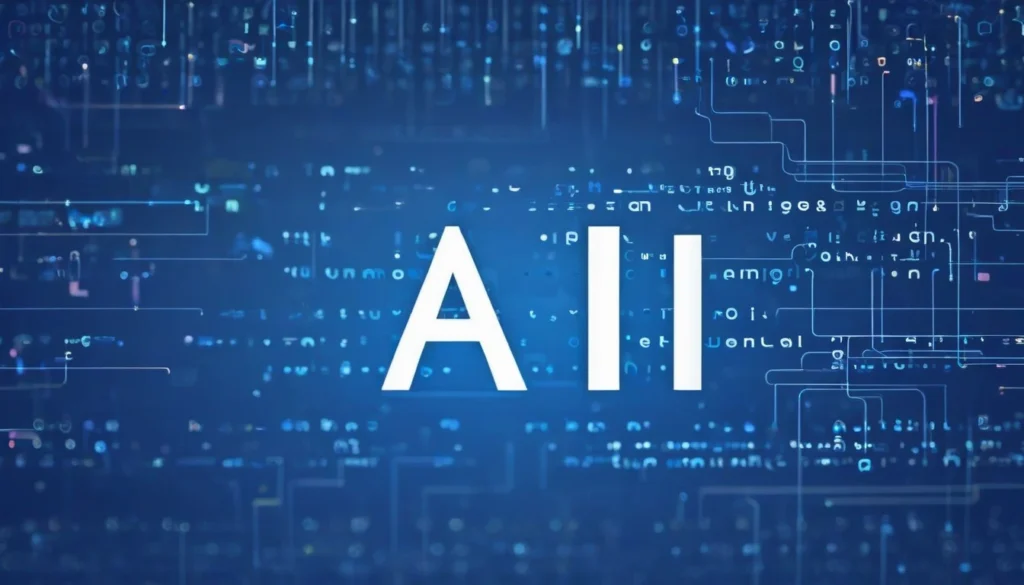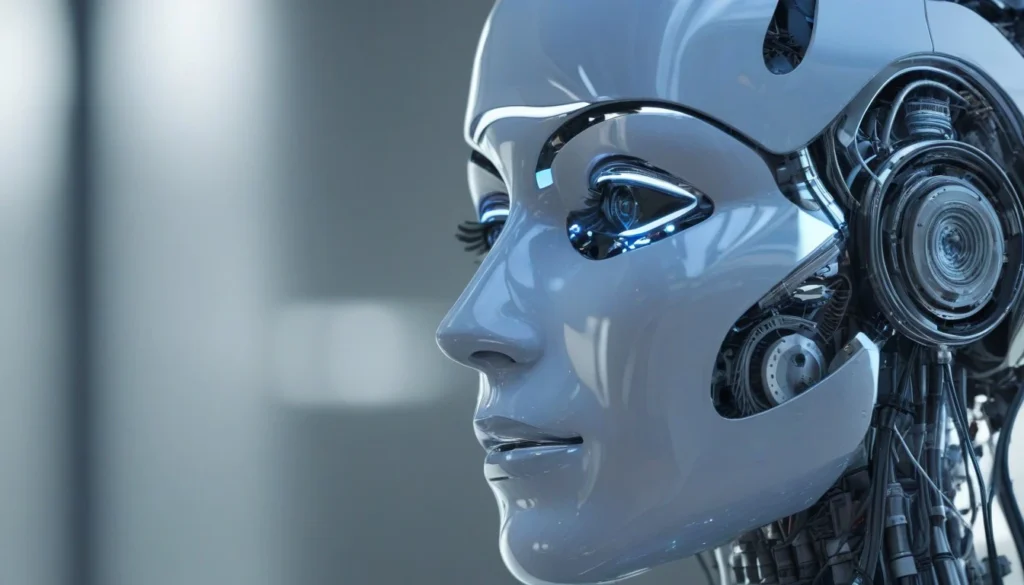What is the Definition of AI?
AI isn’t just sci-fi; it’s everywhere. In simple terms, it’s when machines do things requiring human intelligence. Yes, machines can be smart like humans! Think teaching your computer to think and learn on its own.
Remember voice assistants like Siri or Alexa? They’re mini AIs! They listen, understand (mostly!), and respond like a tech-savvy buddy. AI isn’t just talking gadgets; it’s in video games, making characters react realistically, suggesting movies on Netflix, and even powering self-driving cars.
How? Algorithms – fancy math rules guiding the computer. They learn from tons of data. There’s “Narrow” AI for specific tasks and the grand goal of “General” AI thinking across tasks like us. AI is cool and changing how we live, but questions remain about jobs and its smartness.
In a nutshell, AI is a game-changer—machines doing smart things, learning from data, tackling tasks once human-exclusive. So, when you talk to Siri or win a game, it’s a glimpse into AI’s magic!

Understanding the Concept of Artificial Intelligence
Hey tech enthusiasts! So, you’re diving into the world of Artificial Intelligence, huh? Buckle up, because we’re about to unpack the concept without making your brain feel like it’s doing calculus.
Artificial Intelligence, or AI for short, is like giving your computer a turbocharged brain. It’s not just about fancy robots; it’s about making machines smart. Imagine your computer learning from experience, just like you do. It’s all about algorithms—fancy math rules—that help machines make decisions and learn from data. We’re talking about machines that can play games, chat with you, and even drive cars. AI is like the magic wand making tech not just cool but brainy too!
Examples of AI in Everyday Use
Now, let’s talk real-world stuff. AI is not some distant future dream; it’s happening right now, all around you. Ever chatted with Siri or Alexa? Boom, AI! They listen, understand, and respond like your tech-savvy sidekick. And those video game characters? Yep, powered by AI, making them react like real players. Netflix suggesting your next binge-worthy show? AI is behind the scenes, predicting what you might love based on your watch history. And self-driving cars? They’re not science fiction; they’re AI in action, making split-second decisions on the road.
AI Abbreviation in Different Languages
Wondering how the whole world talks AI? Brace yourself for a global adventure! The abbreviation for Artificial Intelligence is pretty much a universal language: AI. Whether you’re saying it in English, Spanish, French, or Italian, it stays the same. It’s like the secret code connecting techies worldwide. So, no matter where you are, AI is the shortcut to the smart tech revolution.
AI in British and American English
Alright, mates, and howdy folks! AI doesn’t just break language barriers; it even plays along with different English accents. In the UK, they say “Artificial Intelligence” just like us Yanks do. No fancy twists or turns—AI is the same abbreviation rocking both sides of the pond. So, whether you’re sipping tea in London or chowing down on a burger in New York, AI is the word on everyone’s tech-savvy lips.
There you have it, your crash course on AI lingo and how it’s shaping the world around you. Ready to ride the tech wave? Surf’s up, my friend!
How to Use AI in a Sentence?
you wanna sprinkle a bit of Artificial Intelligence (AI) into your sentences? Buckle up, because we’re about to make your words sound as smart as the tech in your pocket.
First off, keep it casual. Instead of sounding like a robot, say something like, “AI helps my phone understand me.” See? Easy-peasy. Now, let’s get a bit more advanced. If you’re feeling fancy, drop a line like, “The magic behind voice assistants is AI.” Bam! You just made AI the rockstar of your sentence.

Now, let’s play with some action words. Imagine saying, “AI predicts what I’ll binge-watch next.” Smooth, right? This is like having a personal movie guru.
If you’re in a storytelling mood, try this: “In the future, AI might power flying cars.” Paint a picture of a futuristic world, all thanks to AI.
Feeling mysterious? Say something like, “AI unlocks the secrets of big data.” It’s like being a digital detective solving tech mysteries.
And hey, don’t forget the global vibe. You could drop, “AI, or ‘Inteligencia Artificial’ in Spanish, is making waves worldwide.” You just turned your sentence into a mini language lesson.
So, whether you’re keeping it chill or aiming for tech guru vibes, using AI in a sentence is a breeze. Sprinkle it in, give your words a tech upgrade, and watch your sentences go from regular to futuristic in no time. Ready to rock those AI-infused sentences? You got this!
Constructing a Sentence with AI
Hey tech explorers! Ready to jazz up your sentences with some Artificial Intelligence (AI) magic? Let’s dive into the world of crafting sentences that make you sound like a tech genius without breaking a sweat.
Start simple. Think of AI as your sentence sidekick. For example, say, “AI makes my phone smarter.” See how you just added a touch of futuristic flair? It’s like giving your words a turbo boost.
Now, let’s talk about being a sentence maestro. Drop this: “AI, the wizard of modern tech, interprets your voice commands effortlessly.” Smooth, right? You just turned your sentence into a tech symphony.
Feeling a bit adventurous? Try, “In the vast galaxy of technology, AI is the star that guides us.” You just made your sentence an epic space journey, all thanks to AI.
Remember, there’s no right or wrong here. It’s about having fun and making your sentences pop. So go ahead, experiment, and let AI be your sentence superhero!

Grammar and Usage of AI in Sentence Structure
Yo, language maestros! Let’s talk about the nitty-gritty of using Artificial Intelligence (AI) in your sentences without sounding like a grammar robot. We’re aiming for that sweet spot where tech meets proper sentence structure.
Keep it flowing. Instead of saying, “AI, which stands for Artificial Intelligence, is my buddy,” go for, “AI, my tech-savvy buddy, understands me.” See how you just kept the rhythm going?
Now, let’s tackle grammar rules. Say, “AI learns from data to predict your choices.” You just made AI the Sherlock Holmes of your sentence—detective vibes!
The key is balance. AI isn’t here to complicate things; it’s here to enhance your sentence game. So, play with words, experiment with structures, and let AI be your grammar ally.
AI as a Tool or a System
Hey, tech magicians! Ever wonder if AI is your tool or the master of the tech kingdom? Let’s unravel the mystery of whether Artificial Intelligence (AI) is your sidekick or the superhero system.
Think of AI like a trusty wrench in your toolbox. For example, “AI, my problem-solving tool, suggests the best route home.” You just turned AI into your navigational genius.
Imagine AI as the grand conductor orchestrating a symphony of tech. Try this: “In the vast realm of technology, AI acts as the central nervous system.” You’ve just turned AI into the mastermind of your sentence ensemble.
Here’s the deal: AI can be your versatile Swiss army knife or the brain behind the operation—it’s all about how you frame it. So, whether it’s your reliable assistant or the backbone of a system, let AI shine in your sentences.
AI Abbreviation in English Language
Alright, language travelers! Let’s decode the language of Artificial Intelligence (AI). Ever wondered how to drop the abbreviation bomb without losing your cool? Get ready for a crash course in making AI the talk of the town.
Keep it snappy. Instead of saying, “Artificial Intelligence, or AI, is fascinating,” go for, “AI is blowing my mind.” You just made your sentence a quick tech thrill.
Let’s add some worldly flair. How about: “AI, also known as ‘Inteligencia Artificial’ in Spanish, is making waves worldwide.” You’ve just turned your sentence into a fun language escapade!
Feel like a linguistic rebel? Try, “In the language of tech, AI is the codebreaker.” You just made AI the James Bond of your sentence—smooth and mysterious.
Whether you’re keeping it local or giving your sentence a global spin, abbreviating AI is the secret sauce. So, sprinkle it in, make your sentences snappy, and let AI be the abbreviation rockstar. Ready to level up your language game? Let’s do this!
How to Abbreviate Artificial Intelligence
Now, here’s the cool part: AI isn’t just an English thing. Nope! It’s the universal language of tech. Whether you’re chatting in English, Spanish, French, or any other language, AI stays the same. It’s like the tech high-five that everyone understands.
But wait, there’s more! AI isn’t just a random abbreviation; it’s the buzzword for smart tech. It’s what powers those voice assistants, helps your phone predict what you’ll type next, and even drives those futuristic self-driving cars.
In a nutshell, AI isn’t just a couple of letters. It’s the key to unlocking the world of tech wonders. It’s the secret sauce that makes our devices smart and our lives easier.
So, next time you hear “AI,” think of it as your tech buddy, simplifying the complex world of Artificial Intelligence into two snazzy letters. It’s the shortcut to a smarter, cooler tech universe. Ready to embrace the power of AI lingo? You’re on your way to becoming a tech word wizard!
Exploring the Definition of AI as an Abbreviation
Hey, fellow tech explorers! Ever wondered what those two letters, AI, really stand for? Let’s dive into this abbreviation wonderland and decode the magic behind Artificial Intelligence.
So, here’s the deal: AI is the cool, condensed version of Artificial Intelligence. It’s like giving a long movie a snappy trailer. You take this massive concept of machines being smart like humans, trim it down, and voila! AI is born.
Think of it as the secret handshake in the tech world. Whether you’re chatting with your mates or diving into the nerdy depths of tech forums, AI is the buzzword that everyone gets.
But it’s not just a name. Nope! AI is the powerhouse behind those voice assistants that chat with you, the brainy software that predicts your next move, and the futuristic tech that’s changing how we live.
In simple terms, AI isn’t just an abbreviation; it’s the magic potion making our gadgets smarter. It’s like turning your regular old devices into super-powered sidekicks.
Understanding the Difference between AI and Other Abbreviations
Alright, tech detectives! Ever got confused between AI and other techy abbreviations? Let’s clear the fog and draw the line between AI and its abbreviation buddies.
AI isn’t your run-of-the-mill abbreviation. It’s the rockstar among them, representing Artificial Intelligence. But then, you’ve got other abbreviations like ML for Machine Learning and IoT for Internet of Things, each with its own superpowers.
Here’s the kicker: AI isn’t just about doing specific tasks like ML or handling connected devices like IoT. Nope! It’s the big umbrella term encompassing various smart tech stuff. It’s like comparing a superhero team—each member has its specialty, but AI is like the Avengers, bringing them all under one roof.
AI Abbreviation in the Context of Technology and Software
Hey, tech wizards! Ready to talk shop about AI in the realm of technology and software? Brace yourselves because we’re zooming into how AI rules this digital kingdom.
In tech lingo, AI isn’t just a word; it’s the MVP. Imagine this: You’re coding a new software, and AI swoops in to make it smarter. It’s like adding rocket fuel to your tech creations.
From gaming to healthcare apps, AI is the secret ingredient that makes things tick. It’s the brain behind personalized recommendations, speech recognition, and even those mind-blowing self-driving cars.
In a nutshell, when techies talk about AI in software, they’re not just chatting about a couple of letters. They’re praising the tech wizardry that’s transforming our digital world.
AI Abbreviation in the Field of Computer and Tech Discussions
Hey there, fellow tech chatterboxes! Ever been in a conversation where AI pops up like the star of the show? Let’s delve into how AI becomes the talk of the town in computer and tech discussions.
When geeks gather ’round to discuss AI, it’s like entering a futuristic brainstorming session. They’re not just tossing around letters; they’re discussing the brainy machines that mimic human smarts.
AI isn’t just a hot topic; it’s the fuel for debates on the future of technology. Some ponder its potential to revolutionize industries, while others raise eyebrows about its ethics and control.
So, the next time AI pops up in tech talks, know that it’s not just a casual abbreviation. It’s the spark igniting discussions about the future of tech and the endless possibilities of smart machines. Ready to join the AI conversations? You’re about to enter the tech universe’s thrilling debates!
How does AI Relate to Machine Learning and Deep Learning?
First off, AI is like the big umbrella term—it’s the boss that oversees everything. Think of it as the cool club where ML and DL are rockstar members.
Now, let’s zoom in on Machine Learning. ML is like AI’s right-hand buddy. It’s about teaching computers to learn and make decisions without explicit programming. You know, like showing a computer a bunch of dog pictures, so it learns to recognize dogs in new pics. Smart, huh? ML is all about patterns and learning from them.
But wait, there’s more! Enter Deep Learning. DL is the hotshot in ML town. It’s all about neural networks—kinda like the brainy circuits in our heads. DL dives deeper into these networks, learning more complex patterns and making sense of vast amounts of data. It’s like teaching a computer to think like a human brain, but without the daydreaming.
Here’s the juicy part: DL is a subset of ML, which itself falls under the grand umbrella of AI. So, AI is the big boss, ML is its close pal handling patterns, and DL is the brainiac within ML, mastering the intricate stuff.
Think of it as a family tree—AI’s the grandparent, ML’s the parent, and DL’s the super-smart kid.
In a nutshell, AI, ML, and DL? They’re not just jumbled letters—they’re the trifecta of smart tech. While AI is the big name, ML and DL are its super-smart offspring, each handling different tasks in the grand scheme of brainy computers.
So, next time you hear these terms, think of AI as the cool parent overseeing its brainy children, ML and DL, as they rock the tech world. Ready to dive deeper into this web of brainy tech? You’re about to unravel the secrets behind these cool abbreviations!
Explaining the Relationship between AI, Machine Learning, and Deep Learning
Hey, tech-curious minds! Ever wondered about the connection between AI, Machine Learning (ML), and Deep Learning (DL)? Let’s break it down into bite-sized tech snacks for you.
AI, short for Artificial Intelligence, is like the big boss. It’s the overarching idea of making machines smart like humans. Think of it as the cool club that ML and DL are part of.
Now, enter Machine Learning. ML is like AI’s trusty sidekick. It’s about teaching computers to learn and make decisions by recognizing patterns in data. Show a computer enough cat pics, and it’ll soon spot a cat from a mile away!
But hold on, here comes Deep Learning. DL is the genius within ML. It dives deep into neural networks, mimicking the human brain’s way of learning. DL can tackle complex tasks, like understanding speech or recognizing faces. It’s like teaching a computer to think and learn on a whole new level.
Think of it like this: AI is the master plan, ML is the sharp pattern finder, and DL is the brainy learner within ML. They’re a trio of tech heroes, each playing a role in making machines sharper.
Role of AI in Advanced Technological Systems
Hey there, tech adventurers! Let’s talk about how Artificial Intelligence (AI) is the superhero in our tech world—especially in those super-advanced systems.
AI isn’t just a buzzword; it’s the magic wand behind the scenes of futuristic tech systems. Think self-driving cars, smart homes, or even those nifty recommendation algorithms on your favorite streaming platform. AI powers them all!
In these systems, AI acts as the brain. It processes tons of data lightning-fast and makes decisions quicker than a snap of your fingers. It’s like having a supercomputer with a mind of its own, constantly learning and adapting to make our lives easier.
Imagine AI as the conductor of an orchestra—directing all the instruments to create a symphony of smart tech.
AI as a Part of Software and Tech Content
Hey, tech enthusiasts! Ready to explore how Artificial Intelligence (AI) sneaks into the world of software and tech content? Let’s unravel the mysteries behind this tech superstar.
In software, AI isn’t just a fancy term. It’s the secret ingredient that makes apps and programs smarter. From voice assistants understanding your commands to software predicting your next move, AI is the brain behind these operations.
Even in tech content, AI plays a starring role. Think about articles suggesting what you might like based on your reading habits—that’s AI in action, making your tech experience personalized and smooth.
In a nutshell, AI isn’t just a standalone concept. It’s the powerhouse that fuels our software and tech content, making them smarter, intuitive, and tailored just for you.
Understanding AI in the Context of Intelligent System and Robotic Technology
Hey, tech explorers! Let’s dive into the world of Artificial Intelligence (AI) and how it fits into the realms of intelligent systems and robotic tech.
AI isn’t only about cool gadgets; it’s the genius behind super-smart systems. Imagine cities using AI to make traffic flow smoother or healthcare systems diagnosing illnesses better—that’s AI doing its magic, making systems sharper and more effective.
And when it comes to robots, AI is the secret sauce. It’s what enables them to learn, adapt, and even interact with humans. From robotic arms in factories to AI-powered chatbots, it’s like giving robots a brain and making them smarter coworkers.
Think of AI as the wizardry that turns regular systems into intelligent ones and robots into brainy assistants, making our world more efficient and futuristic. Ready to embrace the AI-driven future? You’re stepping into a world where smart systems and robots are the new norm!
Where to Find AI Abbreviation in English Language Resources?
let’s talk search engines. Google is your trusty sidekick. Type in “AI abbreviation,” and you’ll unlock a virtual vault of information. Explore reputable websites like Cambridge Dictionary or Lexico to get the lowdown on how AI struts its stuff in English.
Don’t forget the language giants—Grammarly and WordReference. These tech-savvy language companions have your back. Plug in “AI,” and watch them sprinkle their linguistic magic, giving you insights and context like no other.
For a bit of academia flair, dive into university resources. MIT, Harvard, or your local university library’s online catalog—these academic hubs harbor a wealth of linguistic wisdom. Search for “AI abbreviation” and unravel the academic threads woven around this tech term.
If you’re feeling social, join the party on platforms like Reddit. Subreddits like r/language learning or r/linguistics are buzzing hives of language enthusiasts. Drop a question about AI, and watch the community unfold its linguistic brilliance.
And let’s not overlook the tech giants—Microsoft, Apple, or Google themselves. Their style guides and documentation are gold mines for language exploration. Whether you’re peeking into Apple’s developer documentation or Microsoft’s language guidelines, you’re tapping into the linguistic motherlode.
So, there you have it, intrepid language explorers! From online dictionaries and search engines to language giants and academic havens, the AI abbreviation is scattered across the digital landscape. Dive in, explore, and let the linguistic adventure begin!
Referencing AI Abbreviation in Dictionaries and Language Guides
Hey there, language enthusiasts! Ready to unlock the AI abbreviation’s secrets tucked away in dictionaries and language guides? Let’s embark on a linguistic journey through these treasure troves.
Online dictionaries like Merriam-Webster or Cambridge Dictionary are your linguistic mentors. Search ‘AI abbreviation,’ and voila! You’ll find the concise definition and usage examples. This is like having a language guru at your fingertips.
Then there are language guides—your trusted companions in the world of words. From Oxford English Grammar to style guides like Chicago Manual of Style, these gems shed light on how AI flexes its linguistic muscles in formal contexts.
Be sure to explore both digital and print versions for a thorough understanding. These resources aren’t just dictionaries; they’re gateways to decoding the AI abbreviation’s usage in the vast landscape of English language rules.
Finding AI Abbreviation in Online English Language Tools and Apps
Tech-savvy linguists, this one’s for you! Dive into the digital realm of online language tools and apps to hunt down the AI abbreviation’s elusive presence.
Grammarly, Word Reference, or even language-specific platforms like Linguee are your digital sherlocks. Plug in ‘AI abbreviation,’ and witness their linguistic wizardry. They don’t just define; they contextualize, guiding you through AI’s proper usage.
For a touch of interactive learning, explore language apps like Duolingo or Babbel. They sprinkle language tips while teaching, providing a fun way to encounter AI in everyday language exercises.
Remember, these digital buddies aren’t just tools; they’re your language partners, making the AI abbreviation more than just letters—it’s a living, breathing part of your language exploration.
Utilizing AI Abbreviation in Practical English Language Context
Now, let’s put that AI abbreviation to work in your everyday English! From emails to social media, using AI in practical language contexts is a breeze.
Crafting an email? Drop ‘AI’ when discussing technological advancements or future projects. It’s like adding a pinch of tech-savvy flair to your communication.
Social media is your playground! Whether it’s a tweet or a Facebook post, sprinkle in ‘AI’ when sharing thoughts on tech trends or cool innovations. You’ll instantly sound like a digital trendsetter.
In professional settings, toss in ‘AI’ during discussions about cutting-edge technologies or data-driven strategies. It’s the shorthand that speaks volumes about your tech know-how.
AI Abbreviation in British and American English Language Usage
Alright, language buffs, let’s decode how the AI abbreviation struts its stuff in the linguistic landscapes of British and American English.
In both versions, ‘AI’ reigns supreme. Whether you’re sipping tea in London or grabbing a burger in New York, AI is the lingua franca of tech enthusiasts.
While the pronunciation remains the same, there might be slight variations in usage. British English might lean towards ‘Artificial Intelligence’ in formal settings, while American English embraces ‘AI’ more casually in everyday conversation.
But remember, whether it’s across the pond or in your backyard, ‘AI’ remains the snappy abbreviation bridging the gap between languages, making tech conversations a breeze in both British and American English.




